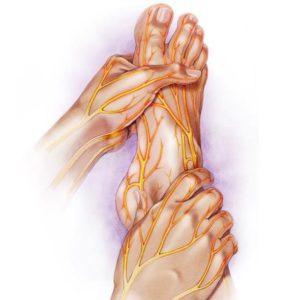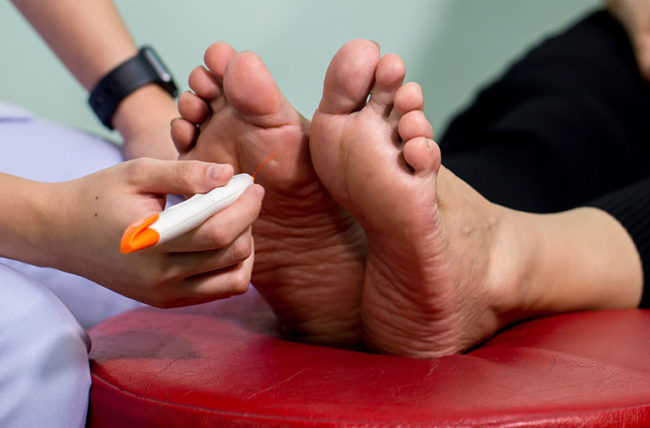Contents
What is Diabetic Neuropathy?
As all know, diabetes is a disease that doesn’t come alone. Rather, it carries a whole and huge family of complications with it. One such problem is diabetic neuropathy. Diabetic neuropathy is nerve damage brought on by uncontrolled blood sugar. Persistent high blood sugar levels can cause injury to nerves throughout the body. Mostly, the damage is done to the legs and feet.
It’s a serious diabetes complication affecting around 50% of people suffering from diabetes. The only way to prevent it or lower its effects is to keep regulating and maintaining normal blood sugar levels.
Causes of Diabetic Neuropathy
It’s true that the leading cause of diabetic neuropathy is diabetes. but there are several other reasons that contribute to this condition. They are mentioned here:
- Diabetes: With time, high blood sugar levels in your body making relations with high levels of fats present in your body damages the nerves and the small blood vessels.
- High levels of fats
- Autoimmune diseases: Diseases such as Sjogren’s syndrome, lupus, rheumatoid arthritis, Guillain-Barre syndrome, chronic inflammatory demyelinating polyneuropathy, and vasculitis.
- Bone marrow disorders: this is one of those rare kinds of diseases that result from an abnormal protein in the blood. it is a form of bone cancer.
- Infections: Lyme disease, shingles, Epstein-Barr virus, hepatitis B and C, leprosy, diphtheria, and HIV. These are some kinds of viral and bacterial infections that cause diabetic neuropathy
- Tumors: cancerous and non-cancerous growths sometimes develop on the nerves, or you can say they press the nerves.
- Chemotherapy: Some medications, especially those given to cancer patients, ie, chemotherapy also causes peripheral neuropathy.
- Vitamin deficiencies: vitamin b deficiencies including B-1, B-6, and B-12, and Vitamin E are important for your nerves to stay healthy. Lack in these doesn’t result in good. Also, people addicted to alcoholism suffer from vitamin deficiencies. So alcoholism can also be one of the reasons for peripheral neuropathy.
Types of Diabetic Neuropathy
People with diabetes may suffer from four types of diabetic neuropathy. They may be:
- peripheral neuropathy
- autonomic neuropathy
- focal neuropathy
- proximal neuropathy
All these types of diabetic neuropathy can be categorized under how and where do they occur. Let’s discuss their symptoms and treatments one by one.
Peripheral Diabetic Neuropathy
It is a type of diabetic neuropathy that typically occurs in the feet or legs. However, in some cases, it is also seen affecting hands and arms. This is one of the most common types of diabetic neuropathies. It is so common that around half of the people suffering from diabetes get affected by this peripheral neuropathy. Peripheral neuropathy is a result of damage to the peripheral nerves. These are the nerves located outside the brain and spinal cord.
Symptoms of Peripheral Diabetic Neuropathy
Symptoms of peripheral neuropathy range from mild to severe. It depends upon the intensity of the effects. The symptoms include:

- numbness
- tingling sensation
- burning sensation
- insensitivity to temperatures
- sharp pain when you walk
- cramping
- muscle weakness
- loss of balance or coordination, which can make u fall quite often, and you may experience a change in the way you walk.
- loss of muscle tone in your hands and feet.
It has been noticed that patients usually experience these pains and discomforts even in the worst forms during the nights. It is possible that the symptoms are felt only on one side of the body and not on both sides.
Diagnosis of Peripheral Diabetic Neuropathy
Based on the symptoms of the patients, their medical and family history, doctors perform physical examinations and tests.
A diabetic patient should get a thorough check-up, at least once a year to make sure if his /her legs and feet are feeling properly. Basically, the doctors under such examinations check for the blood flow and sensation in your feet and legs.
To check thyroid problems, kidney disease, or low vitamin B12 levels, doctors prescribe blood tests.
Prevention of Peripheral Diabetic Neuropathy
The most important and effective preventive measure is to try and keep your blood sugar levels close to normal. at the same time, manage your blood pressure, and cholesterol levels.
Make sure that you are keeping an eye on your foot health, that is, check your feet for problems every day and don’t even think of ignoring if there is any. meet your doctor right away. go for a thorough foot check-up if you have diabetes.

Treatment for Peripheral Diabetic Neuropathy
Usually, doctors prescribe some medicines for nerve pains. they might go for some other treatments as well.
Medications for nerve pains:
Here, it is most important to learn that medications prescribed by doctors to relieve nerve pains have side effects. Some of them are:
- Anitdesperrants such as nortriptyline, desipramine, imipramine, amitriptyline., duloxetine, venlafaxine, paroxetine, and citalopram.
- Anticonvulsants such as gabapentin and pregabalin. these medicines are produced to treat seizures.
- Some skin creams, sprays such as lidocaine.
You might have heard by some of the other doctors that one should avoid over-the-counter pain medicines, or pain killers because they harm you in the long term. Also, these medicines are not helpful in treating nerve damages. rather, they just give relief from the pain for time being. It’s not a permanent cure.
Other treatments for nerve pain:
- Physical therapy: This helps you improve your strength and balance.
- Bed Cradle: this is a device that makes sure that you keep sheets and blankets off your legs and feet while you sleep.
Autonomic Diabetic Neuropathy
This is a type of diabetic neuropathy that hits the nerves of the internal organs. Autonomic neuropathy can cause problems to your heart, digestive system, bladder, sex organs, sweat glands, eyes. under this condition, you also fail to sense hypoglycemia or low blood sugar levels. This is called hypoglycemia unawareness.
Symptoms of Autonomic Diabetic Neuropathy
The symptoms of autonomic neuropathy are different depending on the area of the body that has been affected. Let’s discuss them one by one.
1. Heart Rate and Blood Pressure
When the nerves responsible for heart rate and blood pressure are affected, they begin to respond slowly. Because of this, you may faint when you stand up suddenly from lying down or sitting, or when you are doing any physical activity or exercise. You might feel fluctuations in your heart rate. The heart rate might speed up or slow down.
Nerve damage around this area is so bad that it prevents you from feeling chest pain even when you are having a heart attack, or when your heart is unable to receive enough oxygen.
2. Digestive System
Diabetic neuropathy can cause damage to the nerves in the digestive system as well. after which you notice the following:
- nausea,
- fullness
- floating
- constipation
- diarrhea
- vomiting
3. Bladder
Nerve damage in the bladder will show up the following symptoms:
- no feeling to urinate
- leaking drops of urine (called urinary incontinence)
4. Sex Organs
When nerves present in sex organs are affected due to diabetic neuropathy, men suffer through:
- erectile dysfunction
- problems with ejaculation
And when women are badly affected by diabetes, the nerves in the sex organs get damaged due to which she suffers through dryness in the vagina while having sex. It also happens that a woman might feel less sensation around the vagina or have difficulty having an orgasm.
5. Eyes
Diabetes affects your vision, you may:
- find problems while responding to light and darkness
- take time to adjust when you enter a dark room
- find problems while driving, especially during nights
Diagnosis of Autonomic Diabetic Neuropathy
Your doctor will need to perform different tests based on your symptoms.
- tests to unturn the causes of constipation, and diarrhea
- gastric emptying scintigraphy tests
- gastric emptying breath tests
- ultrasounds for bladder and urinary tract.
Treatment of Autonomic Diabetic Neuropathy
Treatment for this type of diabetic neuropathy depends on the symptoms and the affected areas. For example, if the nerves in your digestive system are affected badly your doctors would ask you to change your diet to treat digestive problems. He might prescribe some medicines if need there be.
They will advise you to follow a proper bathroom routine because the damage caused to the nerves in the bladder prevents you know when the bladder is full and there is a need for you to pee. In case of bladder infection, the doctors will prescribe some medicines.
For erectile dysfunction, some devices or medicines are recommended. For curing vaginal dryness as a result of diabetic neuropathy, gynecologists suggest lubricants.
Focal Diabetic Neuropathy
Under this condition, generally, the focus of damage is on one single nerve, that appears mostly in hands, head, torso, or legs. In comparison with the above two types of diabetic neuropathy, which are peripheral and autonomic neuropathy.
Focal Neuropathy can be further categorized into two types:
- Entrapment neuropathies: This occurs in the areas where nerves pass through narrow areas, such as between bones and tissues. and where the nerves are trapped or compressed. Those who have diabetes, are more likely to have such entrapments. one of the most common entrapments is called carpel tunnel syndrome. The others are ulnar entrapment and peroneal treatment.
- Cranial neuropathies: These happen due to nerve damage in the eyes or in any other area of your face.
Symptoms of Focal Diabetic Neuropathy
If you are facing focal neuropathy that results because of entrapment, you might feel pain and some other symptoms in your hand, leg, foot, and torso.
Cranial neuropathies affect the nerves in the head. so these can be the symptoms:
- Double vision
- bell’s palsy, i.e., paralysis in one side of the face
- pain behind one eye
- problems in vision focus.
Diagnosis of Focal Diabetic Neuropathy
For diagnosing focal neuropathies, doctors perform tests such as nerve conduction studies and electromyography (EMG). The former test is done to check whether the nerves in a different part of the body are able to respond to the electrical signals moving through them. Whereas, EMG is the test done to see whether the muscles are responding to your nerves.
Treatment of Focal Diabetic Neuropathy
It is often seen that doctors usually prescribe the same treatments or medicines as they do for patients with peripheral neuropathies. Patients with trapped nerves are suggested to wear a splint or brace that can take the pressure off from the nerve, and also some medicines. If the condition gets worsened, doctors may tell you to go for surgery also.
And those focal neuropathies with untrapped nerves get recovered within a few weeks or months, without treatment.
Proximal Diabetic Neuropathy
This is a rare type of diabetic neuropathy. The nerve damages under this condition in the areas such as hips, buttocks, or thighs. Usually, it is seen that one side of the patients’ body is affected.
However, it may affect the other part also, but in rare cases.
Men are seen as more prone to proximal neuropathy than women. Also, people above 50 are mostly affected by this. Studies say that most people with proximal neiropathy have type 2 diabetes.
Symptoms of Proximal Diabetic Neuropathy
The following symptoms usually go away with time. But in some conditions, they never go away completely.
- Severe pains in hips, buttock, or thighs
- weakness in the legs making it difficult to stand after sitting for long
- loss of muscle tissue
- weight loss

Diagnosis of Proximal Diabetic Neuropathy
Doctors use the same devices and methods as used to diagnose focal neuropathy, such as nerve conduction studies and electromyography. To check the speed of electrical signals being received by your nerves. And, EMG is the test done to see whether the muscles are responding to your nerves.
Treatment of Proximal Diabetic Neuropathy
Again, the same treatment is provided by the doctors that they use for patients with peripheral neuropathy pain. He will recommend physical therapy that will help you in daily activities. Often, people with this diabetic neuropathy recover without any treatment, but it may take time, sometimes even a few hours.
A Word From MantraCare
Do you want to get rid of diabetes? Join our online diabetes consultation program and reverse your Diabetes naturally through lifestyle changes such as a Personalized Diet plan, Exercise, dieticians, and health coaches.



